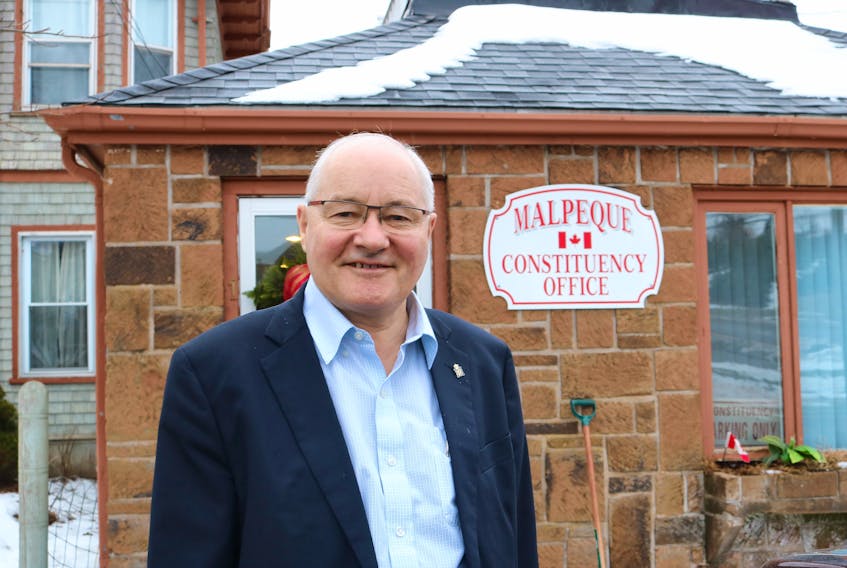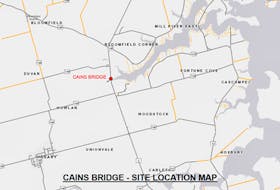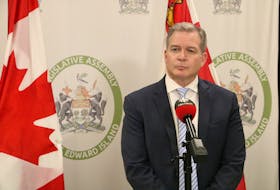HUNTER RIVER, P.E.I. - Wayne Easter has gone from leading farmers in protest up the steps of Parliament Hill to being in the inner circles of cabinet.
But in recent months, Easter has publicly mused about ending his political tenure. In October he told the Hill Times newspaper he was unsure if he would run for his ninth straight election. Now, after 25 years serving as the member of parliament for Malpeque, Easter says he is ready to run again in 2019.
“I thought seriously about it and I will be running,” Easter said. “I think I'm fairly effective at what I do in terms of influence within the party.”
If elected, Easter said he plans to serve a full term. At a time of heightened tensions with the United States, he said he made the decision because his experience and his relationships with U.S. senators will be an asset to the federal government.
“It's important for some of those that have had quite a number of years of experience in the party to remain,” he said. “We still have a fairly rookie government.”
There is no doubt Easter has had significant influence on Island politics, both on Parliament Hill and as a leader of farmers in the turbulent 1970s and 1980s.
Easter’s role as an advocate began in the early 1970s after he became involved in a growing – and very aggressive – organization called the National Farmers Union (NFU). He first became involved after his cousin, Allan Ling, convinced him to take part in a 1971 civil disobedience campaign, known as the ‘tractor protests’.
In the summer of that year, hundreds of farmers began blocking major highways across the province. These “gatherings” as farmers described them, were intended to pressure the then provincial government of Alex Campbell to address the declining fortunes of family farms. Agricultural net income that year was the lowest the province had seen since 1934.

Easter would go on to become president of the National Farmers Union (NFU) in 1982, serving in the position for more than a decade. A campaign to keep a rail transportation subsidy that benefited prairie farmers, known as the “crow rate”, saw Easter organizing protests of farmers on Parliament Hill and at the Saskatchewan legislature in Regina.
After retiring from the NFU, it was once again Easter’s cousin, Allan Ling, who convinced him to make the jump into federal politics.
“Allan said, ‘Look, Catherine Callbeck is stepping down as member of Parliament to run for leadership of the provincial Liberal party. You should take a run at being an MP’,” Easter said.
It was the summer of 1993, and the Progressive Conservative government, which had been led for almost nine years by Brian Mulroney, appeared vulnerable. Easter had worked with Liberal MPs on national campaigns opposing the Free Trade Agreement, the precursor to the recently re-negotiated North American Free Trade Agreement (NAFTA) treaty.
After more than two decades as an advocate, Easter felt this was a chance to make an impact on a national scale.
“You're perhaps closer to the centre of power if you're a part of a government,” Easter said, recalling his thinking at the time.
“So, you do have probably more influence.”
Easter would win his seat by a 5,000-vote margin. He eventually came to accept the NAFTA agreement, and believes the market access it opened up has benefited Island farmers.
In 2002, Easter was named solicitor general under the leadership of Jean Chretien. He had a front-row view on the decision of the Chretien government not to follow the U.S. government into war with Iraq. Easter recalls that after the federal government came to this decision, it fell on him to inform his counterpart, U.S. attorney general John Ashcroft.
“It wasn’t the most upbeat call,” Easter said.
Easter served as parliamentary secretary to the minister of fisheries and oceans from 1997 to 1999, and to the minister of agriculture from 2004 to 2006. He is currently the chairman of the finance committee and is a co-chair of the Canada-U.S. Inter-Parliamentary Association.
At times, he has taken on causes that put him at odds with his own government. In the late 1990s, Easter fought against the introduction of recombinant bovine growth hormone (rBGH), a genetically manufactured hormone intended to increase milk production. Easter stood with members of the opposition against introducing the hormone, arguing its use could be detrimental to both human and cow health.
To this day, rBGH remains banned by Health Canada.
“That was a fight that I'm really, really proud of,” Easter said.
But Easter said he is most proud of the work he has done helping constituents from his office, right across from the Irving gas station in Hunter River.
“People that walk into this office, they have real life, everyday issues that affect them personally,” he said. “The greatest satisfaction is when you can do something for those people.”









